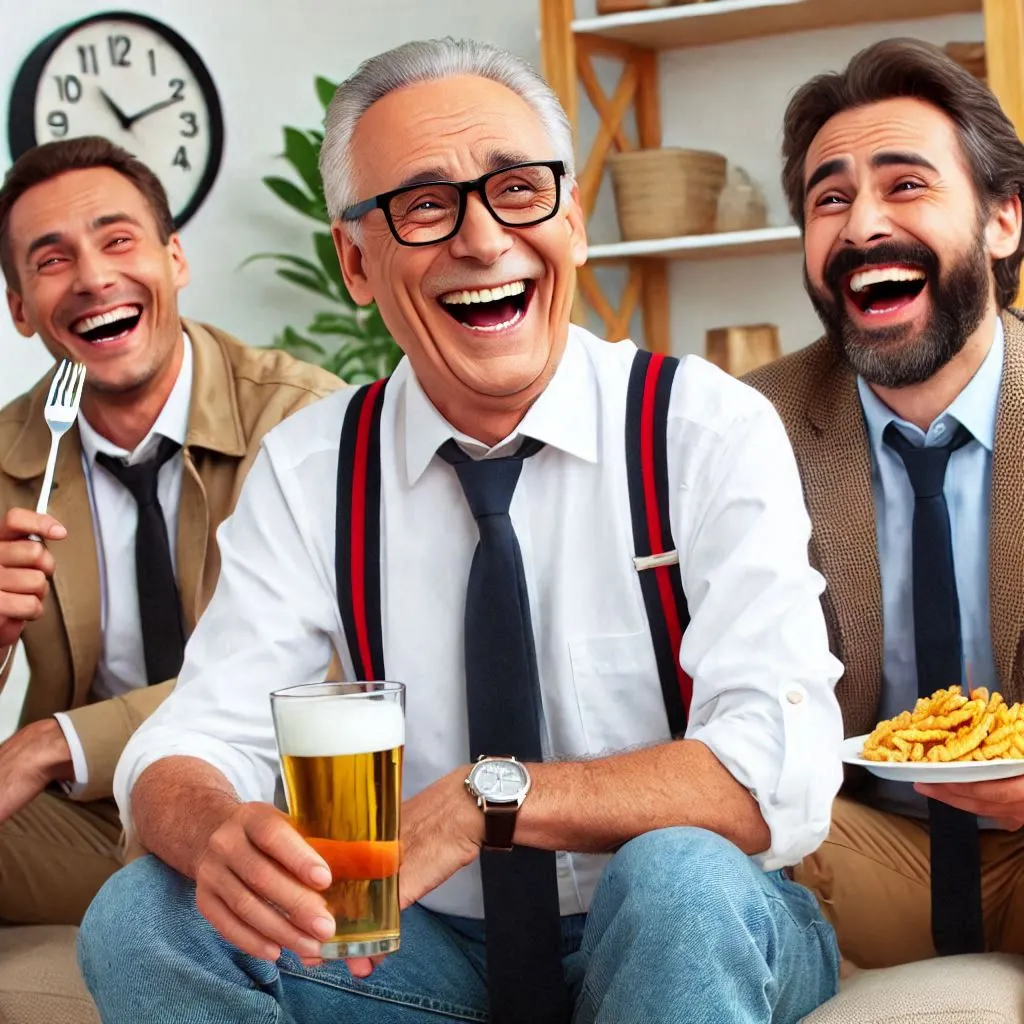- Best Gifts for New Moms in 2025(In-Depth) - 04/25/2025
- How to Choose the Right Perfume for Yourself - 04/11/2025
- Always Discreet Adult Incontinence Underwear 2025 - 04/10/2025

Table of Contents
The Funniest Dad Jokes: A Compilation of Humor for Every Generation
Introduction
Dad jokes have long been a source of groans and laughter alike. These jokes, often characterized by puns, wordplay, and the occasional cheesy delivery, have a charm that transcends generations. But why do dad jokes continue to be so beloved? In this article, we explore the science behind dad jokes, showcase some of the funniest examples, and provide insight into the lasting appeal of this particular brand of humor.
The Science Behind Dad Jokes
Dad jokes aren’t just funny because they’re bad—they play on our innate understanding of language, expectation, and surprise. In fact, some research has suggested that humor itself has cognitive and emotional benefits. A study by the Journal of Consumer Research found that humor can foster social bonds and even make difficult conversations easier (Martin, 2007). Dad jokes, with their low-risk, often non-offensive humor, excel at breaking the ice and creating a moment of connection.
But why are dad jokes so often cringe-worthy? The answer might lie in their predictability and simplicity. These jokes are usually so simple that you can anticipate the punchline almost as soon as the setup begins. However, that predictability doesn’t necessarily make them less funny—it just shifts the type of laughter from surprise to the satisfaction of recognition.
Table 1: The Most Common Features of Dad Jokes
| Feature | Description | Example |
|---|---|---|
| Pun | A play on words that exploits different meanings of a term. | “I’m reading a book on anti-gravity. It’s impossible to put down.” |
| Groan-worthy | The punchline is so simple that it’s often met with a groan. | “Why don’t skeletons fight each other? They don’t have the guts.” |
| Family-friendly | The humor is non-offensive and safe for all ages. | “What do you call fake spaghetti? An impasta.” |
| Predictability | The punchline is often easy to predict, making it a comfort. | “I used to play piano by ear, but now I use my hands.” |
| One-liner | Short, concise jokes that deliver quick humor. | “I only know 25 letters of the alphabet. I don’t know y.” |
Types of Dad Jokes
There are various categories of dad jokes, each bringing a unique flavor to the table. Let’s explore some popular types of dad jokes:
1. Puns and Wordplay
The most classic type of dad joke, puns involve using words with multiple meanings or similar sounds to create a humorous twist. These jokes often elicit eye-rolls due to their simplicity but are undeniably effective.
- Example: Why don’t oysters donate to charity? Because they are shellfish.
2. One-Liners
Short and sweet, one-liners pack a punch with minimal effort. These jokes are typically very direct, with no elaborate setup.
- Example: I told my wife she was drawing her eyebrows too high. She looked surprised.
3. Absurd Logic
Sometimes dad jokes go to absurd lengths to justify a punchline. These jokes often have a dry delivery, making them even more humorous.
- Example: Why don’t scientists trust atoms? Because they make up everything.
4. Animal Jokes
Animals are a favorite subject for dad jokes. From birds to fish, these jokes bring a lighthearted charm.
- Example: What do you call a fish that practices medicine? A sturgeon.
5. Food Jokes
Food-related dad jokes are particularly relatable, making them an evergreen favorite.
- Example: I would tell you a joke about a pizza, but it’s too cheesy.
The Importance of Dad Jokes in Family Dynamics
Beyond just making people laugh, dad jokes play a significant role in family life. According to a study published in Developmental Psychology, humor can act as a bonding tool between parents and children (Fivush & Fromhoff, 1988). Dad jokes, in particular, create a safe environment for laughter, promoting positive interactions between family members. These jokes also help children develop their cognitive skills, as they often require an understanding of wordplay, context, and timing.
For many children, dad jokes are an early introduction to humor, and they can influence their sense of humor as they grow. As children become more adept at understanding jokes, they may even start making their own versions of dad jokes, continuing the tradition.
Table 2: The Top 10 Funniest Dad Jokes
| Rank | Joke | Genre |
|---|---|---|
| 1 | Why don’t skeletons fight each other? They don’t have the guts. | Absurd Logic |
| 2 | What do you call fake spaghetti? An impasta. | Food-related |
| 3 | I only know 25 letters of the alphabet. I don’t know y. | One-liner |
| 4 | I’m reading a book on anti-gravity. It’s impossible to put down. | Pun |
| 5 | What do you call a fish that practices medicine? A sturgeon. | Animal-related |
| 6 | Why did the scarecrow win an award? Because he was outstanding in his field. | Absurd Logic |
| 7 | I’m on a whiskey diet. I’ve lost three days already. | One-liner |
| 8 | What do you call cheese that isn’t yours? Nacho cheese. | Food-related |
| 9 | Why can’t you hear a pterodactyl go to the bathroom? Because the “P” is silent. | Animal-related |
| 10 | I used to play piano by ear, but now I use my hands. | One-liner |

How to Tell a Perfect Dad Joke
Mastering the delivery of a dad joke is just as important as the content itself. The key to a successful dad joke is timing and a straight-faced delivery. While it may seem simple, telling a good dad joke requires confidence and commitment to the punchline. Here are a few tips to tell the perfect dad joke:
- Keep it simple: The best dad jokes are short and sweet.
- Deliver with confidence: Act like the joke is the funniest thing you’ve ever said, even if it’s not.
- Embrace the groan: The groans and eye rolls are part of the fun. Don’t be discouraged!
- Know your audience: Some dad jokes might not land well with everyone, so be mindful of your audience’s sense of humor.
Conclusion
Dad jokes might not always win awards for sophistication, but they have something special that keeps us coming back for more: simplicity, wordplay, and a sense of nostalgia. Whether shared around the dinner table or passed down from one generation to the next, dad jokes remain a cornerstone of family humor. So next time you hear a dad joke, embrace the groan, and maybe even share one of your own!
References
- Martin, R. A. (2007). The psychology of humor: An integrative approach. Elsevier.
- Fivush, R., & Fromhoff, F. A. (1988). The development of children’s sense of humor. Developmental Psychology, 24(3), 480–486.
External References
🔥 Amazon’s Top Picks for Dad Joke Lovers – Limited-Time Deals! 🔥
Love Dad Jokes? 😂 Take your humor to the next level with these Amazon bestsellers – perfect for dads, joke enthusiasts, and family fun!
🎁 🚀 Hurry! Limited-Time Discounts Available! ⏳
✅ Exceptionally Bad Dad Jokes 📖 – So Awful, Yet So Funny!
✔ Packed with cringe-worthy, groan-inducing dad jokes that never get old!
✅ Funny Dad Mug ☕ – The Perfect Gag Gift!
✔ “Thank You for Teaching” design – the ultimate coffee cup for pun-loving dads!
✅ Pun Intended Party Game 🎲 – Hilarious Game for Pun Lovers!
✔ A must-have for game nights, family gatherings & pun enthusiasts!
👉 Shop Now on Amazon & Grab These Deals Before They’re Gone! 🚀
Recommended Articles:
What Can I Feed a Stray Cat: 2025 Comprehensive Guide – love a happy home
What to Do if You Find a Stray Dog 2025 – love a happy home
- Amazon Best Sellers in Clothing Shoes: Top 10 2025
- Walmart Photo Center: The Ultimate Guide 2025
- Capybara as a Pet: The Ultimate Guide 2025
- Top 100 Attractions in the World 2025
- US Female Movie Stars Top 10
- Who is the Most Handsome Man in the World?
- Top 100 Party Entertainment Ideas 2025
- 100 Best Dad Jokes That Never Get Old 2025
- US Male Movie Stars Top 10
- How to Make Slime: A Comprehensive Guide 2025
- YouTube: Top 10 Funny Videos
- How to Make a Paper Airplane: Complete Guide 2025
- Can Dogs Eat Fruit? A Comprehensive Guide 2025
- The Funniest Dad Jokes 2025
- Guess What Jokes: 2025 A Playful Exploration
- Funny Jokes to Brighten Your Day(2025 Funny Jokes)
- Knock Knock Jokes: 2025 A Playful Dive into Humor
- 2025 Best Dad Jokes to Brighten Your Day
- Understanding Dry Humor: 2025 A Comprehensive Guide
- Funny Responses to “How Are You”: Clever Comebacks
- Dark Humor Memes: 2025 A Deep Dive
- Dark Humor Memes: 2025 A Deep Analysis
- Dark Humor: 2025 A Deep Dive
- What the Difference Between Jokes 2025?
- Funny Jokes: 2025 A Deep Dive into Humor
- Funny Dad Jokes: 2025 A Deep Dive into Humor
- How to Be Funny: 2025 A Comprehensive Guide
- Funny Dad Jokes: 2025 A Timeless Source of Laughter
- Funny Names 2025: Unusual Monikers
- Funny Names: 2025 A Journey Through Humor
- Funny Jokes 2025: Universal Joy
- Funny Jokes: 2025 Exploring Humor
- Calico Cat Names: 2025 Ultimate Guide
- Why Are Dogs So Cute? A Deep Dive into Canine Cuteness
- Can Dogs Eat Tomatoes? A Complete Guide for Pet Owners
- What Can Dogs Eat? 2025 A Complete Guide
- Why Are Cats So Cute 2025
- Can Dogs Eat Cat Food 2025
- Why Does My Cat Lick Me 2025
- 999 Angel Number Meaning: A Complete Guide
- Russell Wilson: The Quarterback of the Denver Broncos
- Denver Broncos: A Storied Franchise in the NFL
- 888 Angel Number Meaning: A Powerful Symbol
- 49ers vs Bills: Comprehensive Postgame Analysis
- 666 Angel Number Meaning: Hidden Meaning
- Meaning of 555 in Love: Spiritual and Symbolic Messages
- Trails: 2025 Pathways to Discovery and Connection
- 333 Angel Number Meaning: A Spiritual Guide
- 222 Angel Number Meaning: A Comprehensive Guide
- 777 Angel Number Meaning: A Comprehensive Guide
- 444 Angel Number Meaning: A Comprehensive Guide
- 111 Angel Number Meaning: A Comprehensive Guide
- Best Ginger Cat Names(25 Types Perfect Choice)
- What is the Krabby Patty Secret Formula?
- Best SpongeBob Party(1 Complete Guide)
- The Lovable Villain of SpongeBob: Plankton
- SpongeBob SquarePants(Character Design and Voice Actor)
- SpongeBob SquarePants: Iconic Character Introductions
- Classic SpongeBob SquarePants Episodes and Quotes
- SpongeBob SquarePants: All Character Introductions
- SpongeBob SquarePants: The Eternal Optimist
- SpongeBob Meme: The Phenomenon Explained
- Toy Poodle: The Perfect Petite Companion
- Toy Story 5: A Journey of Hope and Belonging
- 2024 Black Myth: Wukong Review
- Best Home Theatre Installation(4 Steps)



































































